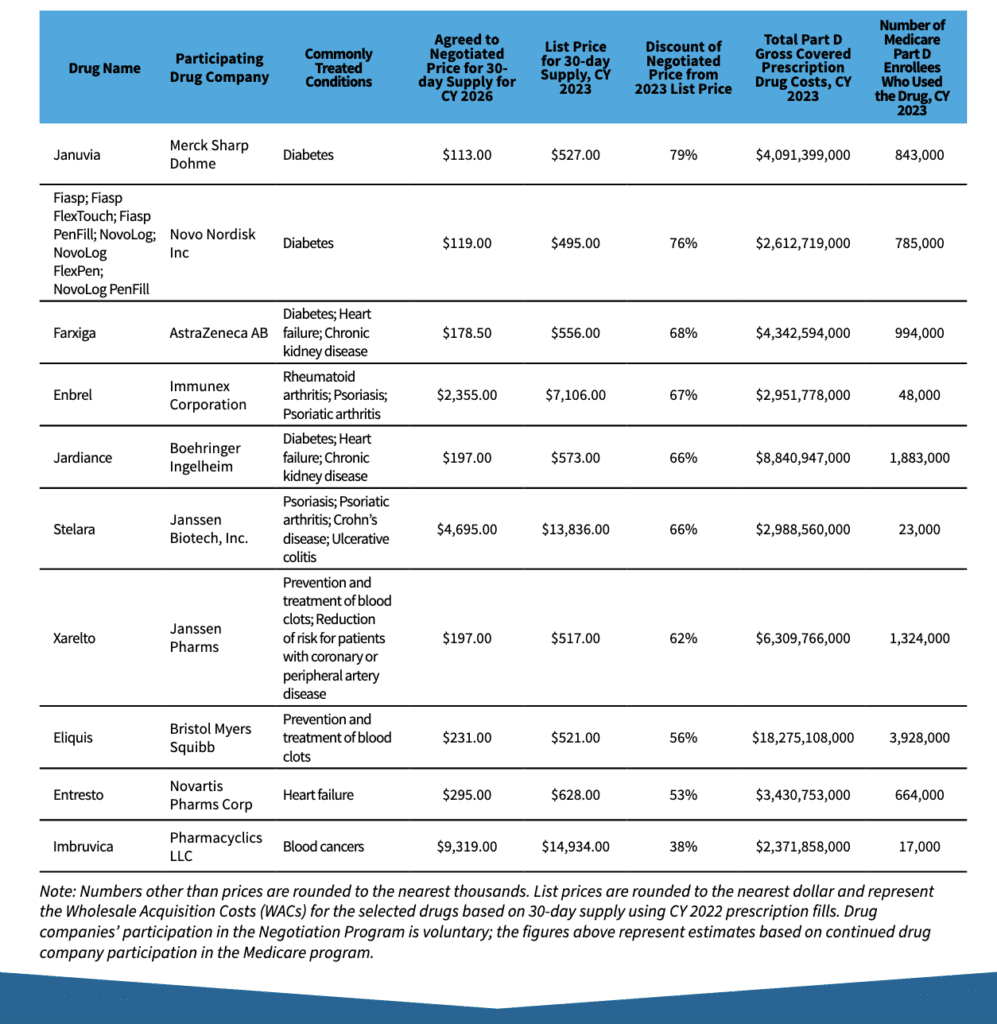Search Posts
Recent Posts
- Real Estate in RI: Seaside waterfront communities are all the rage. Who’s buying – Emilio DiSpirito June 6, 2025
- Outdoors in RI: 2A votes, Charter Yachts, active summer programs, garden tours, aquatic weeds… June 6, 2025
- All About Home Care, with two Rhode Island locations, closing after 22 years in business June 6, 2025
- GriefSPEAK: Angel wings with footprints – Mari Nardolillo Dias June 6, 2025
- Rhode Island Weather for June 6, 2025 – Jack Donnelly June 6, 2025
Categories
Subscribe!
Thanks for subscribing! Please check your email for further instructions.

Medicare Drug Price Negotiation Program to save billions. Cut costs for 10 drugs, 2026 – Herb Weiss
By Herb Weiss, contributing writer on aging issues
Back on Aug. 16th in 2022, President Joe Biden signed into law the Inflation Reduction Act of 2022 (IRA), which aimed to reduce the federal budget deficit, invested in domestic energy production while promoting the use of clean energy. The historic federal law (Public Law 117-169) also lowered the health cost for millions of older Americans by lowering the high cost of prescription drugs by granting Medicare the power to directly negotiate drug prices with drug companies.
IRA also created the first ever annual cap on out-of-pocket drug costs for Medicare beneficiaries, capping the cost of each covered insulin at $35 per month, and the law also made the Affordable Care Act market plans more affordable.
Now, on August 15th, 2024, just one day before IRA’s 2nd anniversary, the Biden administration unveiled the new, lowered prices for 10 drugs in which Medicare and drug companies negotiated under the new Medicare Drug Price Negotiation program. As a result, the negotiated prices will save the Medicare program some $6 billion.
Before a crowd of thousands at the Price George’s Community College in Largo, Maryland, Biden and Vice President Kamala Harris who has become the presumptive Democratic nominee for president, made the announcement.
“We finally beat Big Pharma,” said Biden.
Sixty-five million Medicare beneficiaries give Medicare “collecting bargaining power,” noted the Vice President. “And now Medicare can use that power to go toe-to-toe with Big Pharma and negotiate lower drug costs,” said Harris.
And that they did.
Medicare’s bargaining power puts the brakes on rising drug costs
Empowered by the passage of IRA, Medicare was able to negotiate 38-79% discounts on 10 life-saving drugs that treat heart disease, diabetes, cancer, and other serious conditions. These include popular, brand name drugs such as Eliquis, Jardiance, Farxiga, and Stelara — some of the expensive and commonly prescribed medications in the Medicare program.
The Centers for Medicare and Medicaid Services (CMS) said that people will now save $1.5 billion in out-of-pocket drug costs thanks to newly announced prices negotiated by the Medicare program with Big Pharma. The negotiated prices will save the Medicare program some $6 billion in costs.
According to CMS, “the selected 10 drugs accounted for $50.5 billion in total Part D gross covered prescription drug costs, or about 20% of total Part D gross covered prescription drug costs between June of 2022 and the end of May, 2023, which is the time period used to determine which drugs were eligible for negotiation.”
8 of the 10 drugs chosen had price increases earlier this year, in 2024
Eight of the 10 drugs selected for this year’s negotiation program raised their prices in 2024 – after all 10 drugs were already priced three to eight times higher in the United States than in other countries, noted the federal agency.
The new prices take effect in January, 2026.
Under the IRA’s provisions, Medicare will select up to 15 more drugs covered under Part D for negotiation by Feb. 1, and those prices will take effect in 2027. It will expand to 20 drugs starting in 2028, says CMS.
“It’s no exaggeration to say that this a truly historic moment. We have been advocating for Medicare to have the power to negotiate drug prices with Big Pharma since 2003, when prescription drug coverage was added to the program,” said Max Richtman, President and CEO of the National Committee to Preserve Social Security and Medicare (NCPSSM). “Unfortunately, the law literally forbade Medicare from negotiating prices with drug makers. The Inflation Reduction Act finally changed that, he said.
According to Richtman, billions saved are proof that the federal government can, and should, leverage its buying power to save Medicare beneficiaries money — in this case, giving relief to millions of seniors of not having to pay for high drug costs. “This is momentous news for Medicare beneficiaries and the Medicare program itself,” he says.
“The negotiated prices of these first 10 drugs are a great start. We would like to see even more drugs included more rapidly in the negotiation process so that seniors can reap the maximum cost-savings that this process can provide,” said Richtman.
Responding to the White House’s announcement of new details about Medicare drug price negotiations, in a statement Richard Fiesta, Executive Director of the Alliance for Retired Americans, noted that it took more than two decades of activism on the ground, advocacy by thousands of members, and the Biden Administration to push for passage of IRA, giving Medicare the power to negotiate fair prices to patients and taxpayers.
“The savings are staggering. The new prices are 60% lower on average with two drugs slashed by more than 75% per month,” says Fiesta. “Combined with the $ 2,000 out-of-pocket cap on drug costs that will take effect in January, millions of Americans will be healthier and more financially secure,” he says.
Fiesta notes, according to the U.S. Congressional Budget Office, in future years, the prices of additional drugs will be negotiated and Medicare will save about $100 billion over 10 years.

Not everyone is on board
While President Biden and Democratic lawmakers see the value of granting Medicare the power to negotiate with Drug Companies to lower high drug costs, no GOP lawmaker voted to pass Biden’s IRA last year, a proposal that allowed Medicare to negotiate with drug companies to lower the cost of drugs.
The drug price policies of IRA were the topic of a Sept. 20, 2023 hearing of the Oversight and Investigations Subcommittee of. House of Representatives’ Energy & Commerce Committee. The hearing, “At What Cost: Oversight of How the IRA’s Price Setting Scheme Means Fewer Cures for Patients,” GOP lawmakers sitting on the panel and four witnesses warned how the drug price negotiations could hurt or help market conditions for new medicines.
At the hearing, House Energy and Commerce Committee Chair Cathy McMorris Rogers (R-WA) warned that the “Democrat’s drug pricing control scheme was going to do immense harm to patients by crushing drug innovation. She charged that “unaccountable bureaucrats – not cutting-edge science, backed with entrepreneurial initiative – dictate the value of new cures.”
At press time, GOP lawmakers have remained silent as to their thoughts about last week’s announcement of Medicare lowering the drug prices for ten of the most expensive drugs in Medicare.
But not President and CEO Steve Ubl – Pharmaceutical Research and Manufacturers of America (PhRMA), who released a statement.
“The administration is using the IRA’s price-setting scheme to drive political headlines, but patients will be disappointed when they find out what it means for them. There are no assurances patients will see lower out-of-pocket costs because the law did nothing to rein in abuses by insurance companies and PBMs who ultimately decide what medicines are covered and what patients pay at the pharmacy,” he said.
“As a result of the IRA, there are fewer Part D plans to choose from and premiums are going up. Meanwhile, insurers and PBMs are covering fewer medicines and say they intend to impose further coverage restrictions as the price-setting scheme is implemented. More than 3 million beneficiaries taking medicines with government-set prices will pay more in 2026,” adds Ubl.
Reflecting Roger’s opening statement last year, Ubl noted: “The IRA also fundamentally alters the incentives for medicine development. Companies are already changing their research programs as a result of the law, and experts predict this will result in fewer treatments for cancer, mental health, rare diseases and other conditions. Medicine development is a long and complex process, and the negative implications of these changes will not be fully realized for decades to come.
“The ironically named Inflation Reduction Act is a bad deal being forced on American patients: higher costs, more frustrating insurance denials and fewer treatments and cures for our loved ones.” charges Ubl.
Following in PHARMA’s footsteps, drug companies also issued statements opposing the power given to Medicare to negotiate lower drug prices. Novartis, manufacturer of Entresto, one of the 10 selected medicines participating in the price setting process issued a statement. It called the negotiations “unconstitutional,” predicting “it would have long-lasting and devastating consequences for patients by limiting access to medicines now and in the future.”
Seniors support allowing Medicare to negotiate drug costs so their costs will come down
As Congress began debated the merits of the IRA, a national poll of older Americans tracked wide-support for its provisions to reduce skyrocketing drug costs.
According to KFF Health Tracking Poll, back on Oct. 12, 2021 poll, few accepted PHARMA and drug makers dire warnings that high drug prices are necessary for supporting research into new drugs. Giving the federal government the buying power to negotiate lower drug prices with drug makers and those enrolled in private plans were “favored by large majorities across the political partisans, even if they hear arguments from both sides,” said the San-Francisco-based national newsroom that produces in-depth journalism about health issues.
KFF poll findings indicated that 83% of the public favor allowing the federal government to negotiate with drug companies to lower drug prices on behalf of people enrolled in Medicare beneficiaries and private plans. “This includes 91% of Democrats, 85% of independents, and 76% of Republicans, as well as majorities of seniors (84%), who would be most affected by such a provision, the findings indicate.
As older voters go to the polls, one thing is clear. Lowering the cost of pharmaceuticals is a bipartisan issue. When the dust settles after the November elections, those taking the reins of Congress must not forget this fact and continue to push for policies that will continue to accomplish this.
For a fact sheet from the Medicare Drug Price Negotiation Program, go to https://www.cms.gov/files/document/fact-sheet-negotiated-prices-initial-price-applicability-year-2026.pdf
___
To read more articles by Herb Weiss, go to: https://rinewstoday.com/herb-weiss/

Herb Weiss, LRI -12, is a Pawtucket-based writer who has covered aging, health care and medical issues for over 43 years. To purchase his books, Taking Charge: Collected Stories on Aging Boldly and a sequel, compiling weekly published articles, go to herbweiss.com.
